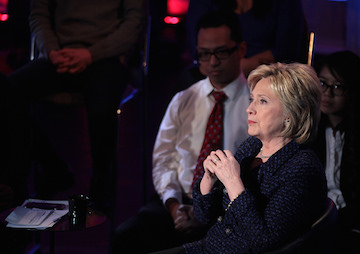The Unvetted Hillary Clinton: Few Tough Questions, Fewer Answers
Doubts remain about Clinton's record on issues beyond her use of a homebrew email server. As a result, the presumptive Democratic nominee is more vulnerable than she should be. Unanswered questions may continue to haunt Hillary Clinton. (Gage Skidmore / CC BY-SA 2.0)
Unanswered questions may continue to haunt Hillary Clinton. (Gage Skidmore / CC BY-SA 2.0)
Unanswered questions may continue to haunt Hillary Clinton. (Gage Skidmore / CC BY-SA 2.0)
Strange as it may sound given her longstanding national prominence, Hillary Clinton may enter the general election without having been sufficiently “vetted.” Clinton, you’ll recall, used that term in the 2008 primary race, warning that the relatively untested newcomer Barack Obama would be eaten alive by the GOP slime machine.
Yet eight years later, after another protracted primary battle, several unanswered questions remain about Clinton’s record—on issues beyond simply her use of a homebrew email server. As a result, she is more vulnerable than she should be, particularly against a candidate who loves to make things up.
Pinning the problem on the biases of the corporate media is a bit too simplistic. Throughout the primary season, Clinton held almost no news conferences—and as the California primary approached, she refused to sit down with editorial boards, including that of the San Francisco Chronicle, hardly a leftist rag.
But even when she was at the podium in debates or across the conference table for an endorsement meeting, the tough questions were few and far between, and rarely yielded sufficient answers. Here’s a sampling.
What, specifically, is Clinton’s agenda? While Rebecca Traister makes a strong case that Clinton is indeed advocating progressive policies on issues like child care, the candidate herself is not doing so. In her June 7 victory speech in Brooklyn, she made no specific policy pledge (thus making Obama’s equivalent 2008 speech seem downright wonkish). Yet on CNN that night, a David Axelrod-led pundit chorus sang praises about Clinton’s item-less oration.
While experience, legislative know-how and judgment are Clinton’s central selling points, it’s still not clear how these qualities match her record. A Senate seat from New York is a rather influential position, yet in the run-up to that state’s primary, no one bothered to ask her to name a few of her signature accomplishments in the eight years she held office. Nor is it clear what positive achievements she can claim during her time as secretary of state—a straightforward question rarely posed directly to her. The GOP is certain to attack her on these points, and she needs to provide her own answers.
As the New York primary approached, Clinton’s top-dollar speeches to Goldman Sachs and other Wall Street players did come under scrutiny. At the April 14 Brooklyn debate, CNN’s Dana Bash pressed Clinton on her refusal to release the transcripts—and Bash stayed on the point even as Clinton tried to equate the secret speeches to Bernie Sanders’ then-unreleased tax returns. Though far less combative than the notorious debate grilling, the New York Daily News’ editorial board meeting with Clinton did include some back-and-forth about the transcripts. But Clinton’s position—that she’s being held to a double-standard because Donald Trump has also given unreleased paid speeches—is sure to be challenged by the Orange Monster, who sells himself as a dealmaker rather than a reformer.
Although Sanders foolishly dismissed it, the email server issue is already at the forefront of Trump’s assaults on the woman he calls “crooked Hillary.” The most memorable exchange about the issue came during the early March debate in Miami. When Univision’s Jorge Ramos asked, in a Benghazi-style inquisition, “Will you drop out of the race if you’re indicted?” Clinton successfully defended herself, responding, “Oh, for goodness sake, I’m not even going to answer that question.”
But in the wake of the State Department inspector general’s report, PolitiFact rated as false her statement in Miami, as well as later to ABC’s Liz Kreutz, that the server was “allowed”. Other than by Ramos, Kreutz and CNN’s Jake Tapper, Clinton’s oft-stated position that her email decision was simply a “mistake” mostly went unchallenged by mainstream media commentators during the primary campaign.
And there is the issue of overlap between the interests of the Clinton Foundation and the State Department’s actions during Hillary Clinton’s tenure. Over the last several months, stories raising red flags—based on Peter Schweizer’s controversial bestseller “Clinton Cash”—have circulated mostly in right-wing media, including Fox News, Drudge and Breitbart.
In the 11th hour of the primary, however, Sanders raised the issue in a discussion with CNN’s Tapper, citing Saudi Arabia’s ties to the Clinton Foundation. In April 2015, The New York Times and The Washington Post joined with Fox News in a partnership to publish stories based on Schweizer’s book. Neither newspaper has done so in 2016, in part because of questions raised about the author’s facts. Even so, “Clinton Cash” is now serving as the basis of assaults from a candidate not beholden to the truth.
Clinton for the moment appears to be in good position heading into a contest against Trump, who can’t stop alienating large groups of people. Yet these issues may continue to haunt her. Many of Sanders’ supporters insisted that corporate media outlets favored Clinton throughout the primary. If that’s the case, did Rachel Maddow and company really do her a favor by not asking tougher questions?
Theodore Hamm (@HammerDaily) is chair of journalism and new media studies at St. Joseph’s College in Brooklyn, N.Y.
Your support matters…Independent journalism is under threat and overshadowed by heavily funded mainstream media.
You can help level the playing field. Become a member.
Your tax-deductible contribution keeps us digging beneath the headlines to give you thought-provoking, investigative reporting and analysis that unearths what's really happening- without compromise.
Give today to support our courageous, independent journalists.






You need to be a supporter to comment.
There are currently no responses to this article.
Be the first to respond.